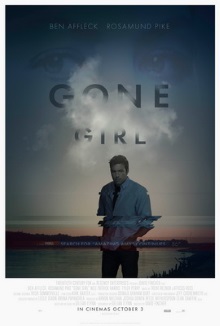
Being a film directed by David Fincher, not to mention one of the most prominent releases of 2014, Gone Girl was always a film that I knew I had to watch. But what really piqued my curiosity was how Broken Forum members reported it as being one of the most misogynistic films they’d ever seen. Last year was a pretty eventful one for gender issues in the United States. It was the year in which Elliot Rodger killed six people and wounded fourteen others in a women-hating killing spree. It was the year that Gamergate got started. It was the year that rape on university campuses entered the national spotlight, culminating in the Rolling Stone debacle on the matter. For all of these reasons, releasing Gone Girl in 2014 seems like very poor timing.
Based on an equally controversial novel, the movie is about a husband, Nick Dunne, who almost immediately falls under suspicion of murder when his wife disappears from their house. It doesn’t help that the wife is a minor celebrity due to her parents using her as the basis for their Amazing Amy line of children’s books, causing the case to instantly receive massive attention from the media. Nor that as the case is investigated by the police, more and more clues emerge suggesting that he is indeed the murderer.
Fincher’s technical acumen as a director is never in doubt and while this film doesn’t exactly stand out as a sensory experience, the visuals serve the story just fine. The performers aren’t at fault either. Rosamund Pike’s acting as the wife earned her an Oscar nomination. I find the worthiness of that decision a matter of debate but her transformation from one role to another in the film is quite remarkable. Casting Ben Affleck as the husband however is a stroke of pure genius. The character is essentially a smug dope who finds it impossible to elicit any sympathy from the public. That’s pretty much Affleck by default!
Yet even with all of this talent working on it, this film just doesn’t work. The story is clearly divided into two disparate halves. During the first half, we get a very promising murder mystery in the same vein of the previous thrillers that Fincher has worked on, except that in this case we see it from the point of view of the character who is the lead suspect. This phase has its share of problems despite its potential, not the least of which is that any viewer who is paying attention can see from a mile away whether or not the husband is really guilty. Spoiler: he isn’t. But watching this play out is an enjoyable process and there’s a lot of pleasure to be had in watching Affleck squirming as the evidence mounts against him.
Then at the halfway point, the film switches mode to show the audience how the wife pulled off her trick and naturally it’s then up to Affleck to convince the world that he was framed. Starting with that clumsy exposition, the movie then proceeds to go completely off the rails. As we see just how insane the wife is and how little we knew her all along, things get ever more surreal and her motivation increasingly unbelievable. In fact, I was cackling madly over how over-the-top and silly things get. The ending that we get is abrupt, farcical and unsatisfying.
As for the misogynistic concerns, I think they’re completely warranted. The wife Amy is after all pretty much exactly what the MRA crowd accuses women of being, even down to using rape accusations as a weapon. After reading comments from the author of the novel, I understand that she believes that feminism should also include having women as villains. The problem is that Amy is a cartoon villain, full of pettiness and lacking subtlety and actual competence. It’s not just that she’s bad, she’s even bad at being bad. True, Fincher isn’t kind to Affleck’s Nick either. It turns out that he really is a wife-beater after all on top of being a lying cheater yet it’s hard to shake the feeling that the audience is supposed to empathize with him. His lawyer all but brofists him as he relates his story.
This being a film by Fincher, we naturally go the extra mile to give him the benefit of the doubt. I must admit that there are interesting themes going on, such as the idea of both partners pretending to be people they are not in order to be the perfect couple, or my wife’s idea that Amy must have turned out the way she has due to her parents’ influence. But try as I might I can’t find any hidden meaning that redeems the movie as a whole. At some point, you just have to throw up your hands and admit that the movie really is as stupid and vile as it appears to be. As such I find this to be a total train-wreck of a movie, albeit one that you will be compelled to watch in fascinated horror right up to the end.
hahahahah “I find this to be a total train-wreck of a movie, albeit one that you will be compelled to watch in fascinated horror right up to the end.” – man, precisely my feeling. The movie doesn’t seem to have any deeper meaning, and although I felt compelled to watch till the end, I can hardly remember any plot lines now.
Ps, Neil Patrick Harris doesn’t really work in his role as the creepy ex, I thought he just felt like he should do a Hollywood blockbuster to pad up his Oscar hosting chances…. Which I really liked incidentally, contrary to most internet comments
Yet frustratingly Gone Girl has very good ratings on sites like Rotten Tomatoes. I keep browsing reviews to see if someone can critically analyze the movie and convince me that it is good, but I just don’t get it.